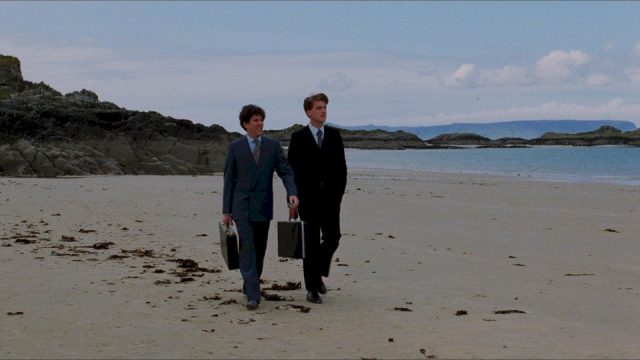This Week You Will Make Tracks to:
- Scotland
- meme movies
- weird comics history
- punk music
- more AI!
Thanks to scb0212 and Miller for leaving their imprint this week. Send articles throughout the week to ploughmanplods [at] gmail, post articles from the past week below for discussion, and Have a Happy Friday!
For the 40th anniversary of Local Hero, Kayleigh Donaldson considers its status in Scottish cinema for Paste:
It threads that fine needle of being extremely for the people it depicts as well as those outsiders who crave a specific image of shortbread tin-friendly coziness. Sure, it fits into some of those neat boxes of Scottishness that tourists love: The fun eccentric locals, the magic of the Highlands, the quiet hints towards a blend of mysticism and history that inspired the likes of Outlander. Yet those qualities never overwhelm the true heart of the narrative, one of a culture clash that—to this Scot—feels sharply familiar. This unhurried life in Ferness, one of immense appeal yet decidedly real, reminds me so much of my own hometown, of the people who populate it. That sense of cloistered warmth, the humor of the familiar faces you see every day who enthrall and infuriate you in equal measure. All the scenes in the village pub are the epitome of a slice-of-life delight. Forsyth could be more caustic, far meaner about his take on Scottishness (see his follow-up to this, the dark crime-comedy Comfort and Joy), but Local Hero is a love letter that’s been heartily welcomed by the country for a reason.
On the eve of similar would-be viral hit Cocaine Bear, Scott Tobias recalls the time the Internet demanded motherfucking snakes on that motherfucking plane:
What people on the internet could not have known at the time is the weird incongruity of the line in the finished film, which of course they had not seen. The public had, in effect, offered notes on a screenplay they had not read and the studio had accepted them. That makes Snakes on a Plane a little different from the tweaks that studios will sometimes order after a test screening suggests that some stretch of a film isn’t working or the ending needs to be changed. The filmmakers were being asked to punch up an imagined film rather than the one they had finished shooting the year before. That’s not to say there’s a massive contrast between the two things—Amadeus was not being retooled into Porky’s here—but there’s a notable incongruity, like slightly mismatched puzzle pieces fused together by an insistent thumb.
Familiar face Sam Scott runs down Shazam’s most bizarre comic book stories of all time:
“Captain Marvel Enforces the Law of Gravity!” in “Captain Marvel Adventures” #31 adds the Council of Gods to the series’ improvised pantheon. After all, if there’s a law of gravity, does that mean a court voted on it? Could they repeal it? One councilman named Gogol does, proclaiming, “It’s an old cheesy law anyway!” Predictably, this is bad news back on Earth, where Captain Marvel zips around the city keeping people from floating off into space, while some gangsters take advantage of the situation by wearing spiked shoes and towing off a safe like a balloon.
At Bandcamp, Yoni Kroll surveys the history of Filipino-American punk music (with plenty of links!):
Eric de Jesus, a musician and poet who grew up in Bethlehem, Pennsylvania in the early 1980s, says that picking up a copy of the Dischord Records Flex Your Head compilation when he was in high school and seeing a picture of Double-O singer Eric Lagdameo, a fellow Pinoy, was life-changing. As he puts it: “I saw his picture on the insert poster and was all, ‘No way! He looks like me! He must be Fil-Am.’ There’s no way to adequately express how empowering that moment was.”
And Jaime Brooks investigates a “musician” using their name on Spotify, and takes a long look (with help from John Philips Sousa) at what artificially generated music will do to the streaming and industry landscapes:
By generating audio that is harmonically similar to classical music, “Jaime” was able to trick Spotify into recommending it to classical listeners. By deploying familiar sounds in a randomized, nonsensical fashion, the resulting compositions were able to bypass copyright filters designed to block infringement of existing works. By targeting a style of music that often appears in sleep-oriented playlists, “Jaime” gained access to the least discerning users on the entire platform. Unconscious adults are very unlikely to notice they’re not listening to Mozart anymore and get up to hit fast forward, especially if the interruptions are brief and unpredictable. This is how generators are going to change the internet in the coming years: by infesting the darkest, most neglected corners of our collective online experience with the digital equivalent of roaches, bed bugs, fruit flies, and mold.


